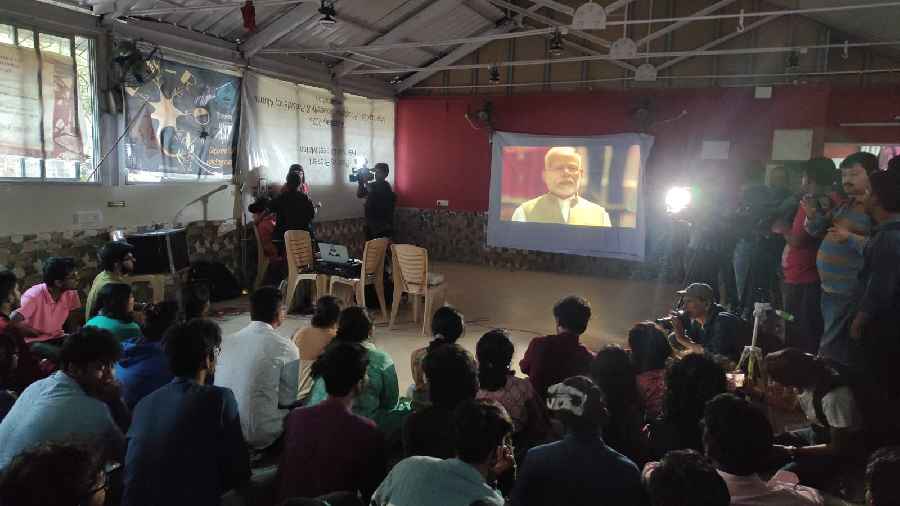A near 30-minute interruption on account of a “power failure” at the Presidency University students’ common room right in the middle of a public screening of the controversial BBC documentary, India: The Modi Question, failed to dampen the spirits of the Students Federation of India (SFI) supporters who had gathered for the show.
Following a spirited demonstration by the agitated students before the chamber of Arun Kumar Maity, the university’s dean of students, power supply was restored to the projector just as mysteriously as it got snapped after about half an hour of initial viewing.
The audience was back in full numbers to resume watching the film for which the organizers had failed to secure an official permission from the university authorities.
The glitch notwithstanding, the organizers managed to conclude the screening of the first of the two-part documentary where 50-odd past and present students of the institution were present from across some select departments which have begun curricular activities after a semester break. The second part, organizers said, would be screened next week when classes at the institution’s College Street campus resume in a full-fledged manner.
At Jadavpur University, the movie was screened for the second consecutive day on Friday, this time by supporters of All India Students’ Association (AISA) at one of the open-air venues of the Arts’ faculty. The SFI had shown the movie on Thursday evening at the same venue. Both screenings passed off uneventfully.
The drama at Presidency premises on Friday afternoon was a near redux of the experience at JNU, Delhi earlier this week where the Left student supporters alleged that power was cut off and ABVP workers pelted stones on them during the screening of the documentary. No students’ violence was reported from Presidency, though.
Although authorities cited no reason officially for the mysterious power disruption to the students’ common room when electricity connection to other parts of the university was allegedly normal, show organizers said that the dean reported that a power fuse got accidentally blown off and was subsequently repaired.
“I have been a student here for the last three and a half years and I have never seen power supply disruption in any part of the university before. This was a clear attempt to sabotage the screening. The authorities buckled under pressure from the students and had to restore power supply,” said Rishav Saha, a university student and SFI leader.
“We were denied permission to hold this show by the university authorities and we could not access the venue where we had initially planned to screen since no halls were allotted. In fact, the authorities told us that we must face the consequences for this. We are determined to do this no matter what those consequences may be,” Bidyabrata Dey, a third-year student of the university, told The Telegraph Online before the screening and its subsequent drama had begun.
But for Abu Baker Parvez, a former student of the university who squatted on the first row on the floor of the screening venue with rapt attention in his eyes when the movie played, the watch experience was “deeply satisfying”.
“The documentary is very well researched. The BBC has put up a brave effort to make this film at a time when censorship seems to be the order. The filmmakers have managed to hurt the sentiments exactly where it deserves to be hurt. I am keenly looking forward to watching the second episode,” he said.
“The screening disruption took nothing away from the content of the movie,” he added.










